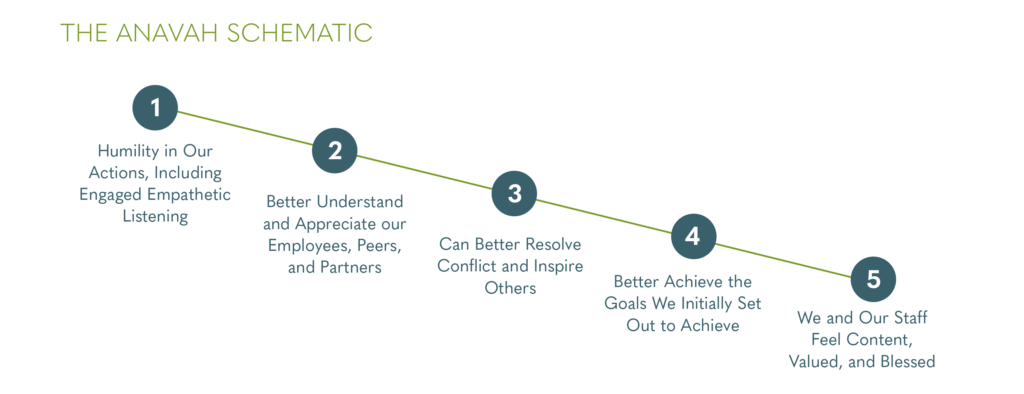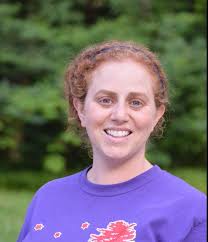
Encourage our employees to explore the middot (values) we find in the practices of Jewish Mindfulness and Mussar, specifically anavah (humility) and kavod (honor). Professionals will then become more motivated and valued in their work as they focus their efforts on those around them rather than their own wants.
הענוה משלימה את הרצון, ובזה היא הכלי היותר טוב לקבל כל ברכה
“Anavah/Humility completes, or makes whole, Ratzon/Will. It is for this reason that [Anavah/Humility] is the best vessel for receiving all blessing.”
The Jewish Practice of Mussar, which includes the study and practice have various personal characteristics based on Jewish values, is centuries old, yet can easily be applied to the current era of work, and motivating our employees. One of these values, is anavah, which can be translated to humility, or having a balance self.
Most of the blessings in Bless Our Workforce advocate a more focused attention to the needs and wants of our employees. Yet this blessing encourages us as managers to encourage our staff to think beyond themselves which perhaps counterintuitively, can increase one’s internal motivation in their own. Consider the process in the Anavah Schematic Below:
How We Manage to Promote Anavah:
- Encourage employees to have humility in their work and in their actions, by advising them to engage in empathetic listening to others needs and interests
- As they engage in empathetic listening, employees will better understand and appreciate each other, their staff and supervisors, and community partners/clients.
- As a result, employees will be in better position both to resolve conflict and inspire others.
- This process will be help our employees better achieve the goals we initially set out to achieve – we are in non-profit after all – our work is about places others needs ahead of our own.
- In engaging in anavah, our staff and us, those that manage them, feel more content, feel valued by our contributions and generosity, and of course, blessed.

Plan of Action:
In motivating those that are naturally humble and to encourage humility in others and follow the practice of Anavah, we can engage in the following strategies:
- Encourage the practice of engaged, empathetic listening in our work places.
- Encourage staff to raise up the positive experiences of others around them.
- Motivate others through Data – beyond the “good job” – demonstrate how their work serving and raising up others is making a real difference.
- Make use of the Love Languages, including : 1) receiving gifts, 2) spending quality time with peers 3) words of affirmation, 4) acts of service or devotion, and 5) appropriate touch — couching each of these uses as evidence that their actions are benefiting others.
Our Portrait: Rachel Felber

Rachel Felber, the director of Camp Wise, the Jewish overnight summer camp of the Mandel JCC of Cleveland, Ohio, embodies Anavah in her Jewish professional work every day, leading hundreds of staff members and campers, and liaising with parents, board members, and other stakeholders each summer. She feels most valued when it is “not about me, it is about my people.”
Rachel’s young life and professional career has mostly been within Jewish Community Centers (JCCs). She always used to joke that she is the ultimate poster child for the JCC Movement. She was a graduate of a JCC pre-school and attended a Jewish day school until 3rd grade. She was the little kid who often asked her parents, “Why don’t we light candles on Friday night?” At some point during her childhood, it become clear in Rachel’s core that a close connection to both the cultural and ritual aspects of Judaism were always going to be important to her.
In fact, Rachel recalls that when she was preparing for her Bat Mitzvah , she asked the Rabbi, “Can I do more for my service?” Unlike most of her peers in the congregation who completed only the minimum requirements, Rachel wanted to do as much as she was allowed and given opportunity to learn more prayers, then lead them. She was tenacious about learning and her own personal growth and has always strived to grow personally and professionals as she raises up those around her.
Questions for Reflection:
- How might we engage our staff in the practice of humility, or anavah?
- How might this practice help us set a culture around a set of healthy work practices that speak to your organizational values?
- How might we adopt one or a few of the love languages in the way we can frame valuing our professionals? Might we ask our professionals which love language (or professional relationship language as it were) speaks most to them as a simple step to help managers understand how to best support, motivate and value their staff?
